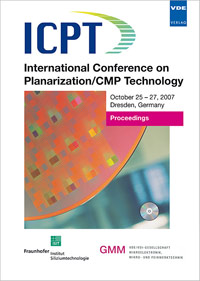The Organic Diamond Disk (ODD) for Dressing Polishing Pads of Chemical Mechanical Planarization
Konferenz: ICPT 2007 - International Conference on Planarization / CMP Technology
25.10.2007 - 27.10.2007 in Dresden, Germany
Tagungsband: ICPT 2007
Seiten: 6Sprache: EnglischTyp: PDF
Persönliche VDE-Mitglieder erhalten auf diesen Artikel 10% Rabatt
Autoren:
Sung, James C.; Chou, Cheng-Shiang; Pai, Yang-Liang (KINIK Company, 64, Chung-San Rd., Ying-Kuo, Taipei Hsien 239, Taiwan, R.O.C.)
Sung, James C. (National Taiwan University, Taipei 106, Taiwan, R.O.C.)
Sung, James C. (National Taipei University of Technology, Taipei 106, Taiwan, R.O.C.)
Sung, Michael (Advanced Diamond Solutions, Inc., 351 King Street Suite 813, San Francisco, CA 94158, U.S.A.)
Inhalt:
Diamond pad conditioners can determine the efficiency of CMP processes and the quality of polished wafers. The polishing rate of a wafer is dependent on the amplitude (height) of pad asperities. The polishing uniformity is controlled by the frequency (density) of such asperities. Current diamond pad conditioners cannot dress the pad to produce microns sized asperities at high density. This is because the tips of diamond grits cannot be leveled to the same height so the grooved pad top is uneven with excessive asperities that may ruin the wafer and under sized asperities that is easily glazed. New designs of diamond pad conditioners have markedly improved the leveling of diamond tips. Organic diamond disks (ODD) are manufactured by reverse casting of polymers. Due to the uniform spacing of diamond grits and their controlled tip heights, none of the diamond grits will be overly stressed. Moreover, all diamond grits are sharing the dressing work. Consequently, the number of working grits of ODD is significantly higher than conventional designs. Moreover, because no diamond will cut pad unnecessarily, the pad life is greatly lengthened. Furthermore, due to the uniform distribution of pad asperities, the slurry will be held efficiently so the run off is avoided. As a result, the slurry usage is reduced. ODD is therefore a significant savor of CMP consumables for semiconductor manufacture.


